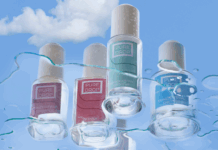Every year, 25,000 tonnes of sunscreen products end up in the oceans, and the chemical sunscreens used in these cosmetics have a negative impact on marine flora and fauna. The victims of this pollution are corals, ecosystems essential to marine life: they are home to 25 % of the planet's marine species and absorb wave energy, reducing coastal erosion. At the same time, plastic waste causes the death of millions of animals: by 2050, there will be more plastic than fish in the oceans.
With these facts in mind, Lucille Ealet and Allan Le Bronnec, two <24-year-old ocean-loving entrepreneurs, launched Kerbi in April 2021. Their goal? To offer more respectful suncare products that can truly meet consumers' current needs. Chemical filter-free, nanoparticle-free and eco-designed, these products have been created to protect the skin while preserving the oceans. They are natural, from composition to packaging.
Eco-responsible suncare products that protect the skin and the ocean
Kerbi products are designed with mineral filters and no endocrine disruptors to guarantee optimum protection for users while having minimal impact on the oceans. Nanoparticles, often found in mineral filters, have been excluded from the design of Kerbi products. This is a precautionary measure, as their real impact on human health is not yet known.
After months of research, Kerbi has developed two products: a sun stick and a sun cream, both of which are vegan, water-resistant and made in France.
Kerbi's commitments:
- A quality composition: the use of mineral filters free of nanoparticles and controversial substances to combine protection against ultraviolet rays and preservation of the oceans.
- Organic and vegan products. Kerbi uses ingredients of organic and natural origin. Our creams and sticks are vegan and not tested on animals, in compliance with European regulations.
- Eco-designed packaging. Kerbi's eco-responsibility extends to its packaging, which has been designed to limit the use of petrochemical plastics. The sunscreen packaging is made from plant-based plastic made from sugar cane, which reduces CO 2 emissions by 75 %. The suntan stick, meanwhile, is packaged entirely in cardboard - a first in France for suncare products. The products are not packaged in secondary cartons.
- 100 % French manufacturing. Research, development and manufacturing of the Kerbi range take place in France, in their partner laboratory specialized in mineral sunscreens. For the brand, this is both a way of minimizing its carbon footprint and of promoting French know-how and employment.
Kerbi's co-founders are full of ideas for developing their brand. They plan to expand their range in the coming years, incorporating active ingredients with Breton connotations and designing even more eco-friendly packaging.
They also want to continue their work to preserve the oceans by raising public awareness. They recently teamed up with Blutopia, a positive, non-profit media organization that centralizes real solutions to empower citizens to take action to protect the oceans.
Eventually, Lucille and Allan would like Kerbi to become a benchmark brand in Western France, Brittany being one of the regions most affected by skin cancer in France.








